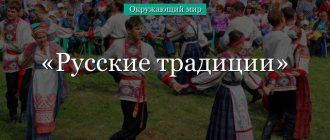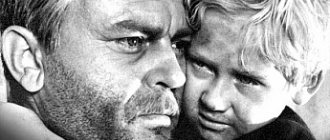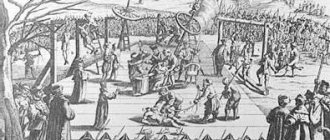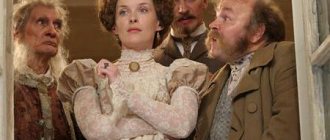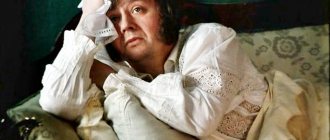- Essays
- On literature
- Nekrasov
- The image of the people in Nekrasov's lyrics
Nekrasov had deep compassion for the Russian people. This is reflected in his work. It happened in the 50-70s of the 19th century. This is the heyday of popular democracy. A wave of popular indignation is rising throughout Russia. The intelligentsia hoped that a peasant revolution would occur.
And even though his poems were not written according to the literary canons of that time, they touch the soul and excite. The lines are etched in your memory for life. It seems that his Muse is a peasant woman who constantly works in corvee labor, gives birth in a field, in a haystack. She has no time to take care of the child, she is forced to work.
In the poem “Troika” Nekrasov describes the life of a Russian woman. A beautiful young woman saw a handsome gentleman in a passing troika and ran after her. She hopes that maybe he will stop and take her with him. What awaits her here?
An always drunk husband, a bunch of snotty kids and a grumpy mother-in-law. And she will forever endure the beatings of her drunken husband and the eternal discontent of her mother-in-law. This poem is like a romance. It turned into a folk song.
Poem “Reflections at the Front Entrance.” People come here to ask for something. Here come the peasants. But the doorman didn’t even let them in, because they were poorly dressed and smelled bad. No one is interested in the sorrows and suffering of the common people. Nekrasov accurately expressed that there is no such corner in Russia “where a Russian man does not moan.”
It also groans on the Volga, when it pulls ships and barges towards itself. These are “barge haulers walking along a towline,” harnessed like horses or dogs. Looking at all this, Nekrasov’s heart bleeds and his soul breaks. And he asks the people how long will he suffer? How much strength does he have? Isn't it time to wake up? The creative intelligentsia is already hinting at some changes in society.
The poem “On the Road” is interesting. It is about a serf peasant woman whom her owners trained, educated, and then married to a simple man, a coachman. And she is forced to chop wood, carry water, and do corvée work. But the girl saw a different life, she wants to live like this, but she is like a bird in a cage.
Her husband feels sorry for her, but calls her “white-handed” and “white-faced.” He doesn’t understand why she reads books, looks at someone’s portrait for a long, long time and cries. Her husband is unable to understand her. For him, a woman is a woman, a draft horse. What kind of soul could she have? Due to the whim of the nobles, both husband and wife are unhappy.
Long poem “Who Lives Well in Rus'.” Nekrasov wrote it for 13 years. He tried to comprehend what the reform of 1861 brought to the peasants. It is written from the perspective of seven wanderers who travel around Russia and are looking for a happy person. At the end he asks a rhetorical question: “The people are liberated. But are the people happy?
The nationality of N. A. Nekrasov’s lyrics
1. Variety of lyrical heroes in poetry. 2. The fate of the heroes of the poet’s lyrics. 3. The meaning of Nekrasov’s poetry.
The poetry of N. A. Nekrasov is evidence of the life of a simple Russian person, with his sorrows and joys, tragedies and everyday scenes. Nekrasov's lyrical heroes are diverse: they are peasants, workers, barge haulers, and master's servants. The poet in his poems gives each of them the right to vote so that he can talk about his fate and complain about painful things. In the obituary for the poet’s death, Birzhevye Vedomosti (No. 334, 1877) wrote: “Russia has lost in him a poet who was the first to be able to look into the heart of a simple Russian person and express his overwhelming sorrow and hopes in powerful verses that are involuntarily imprinted in the memory of everyone. The younger generation first of all memorized Nekrasov’s poems and from them learned to sympathize with the people’s grief and be aware of their civic responsibilities to the people. The sad news of the writer’s death will penetrate into the most remote corners of our fatherland and will evoke sincere condolences for him as a powerful public figure.”
Each poem by N. A. Nekrasov is a folk groan, a tragic story. So, for example, the poem “On the Road” tells us about the fate of the unfortunate Grusha, destroyed by the masters, and about the grief of her coachman husband. She, brought up by a noble whim as a real young lady, suddenly found herself in the position of a peasant's wife. We sympathize with both the coachman and Grusha. But at the same time, we cannot help but note the deep ignorance of the coachman, who treats enlightenment with suspicion and even as if it were some kind of evil: He keeps looking at some picture and reading some book... Sometimes fear, you hear me, aches, What will she do to ruin her little son: She teaches literacy, washes, cuts hair... Pear, having received an upbringing and been introduced to culture, strives for happiness, but this desire cannot be realized in the social conditions in which she finds herself. But her husband’s life is also crippled - widowhood awaits him ahead, and nothing can be changed here. Broken dreams, the predetermination of the life and fate of a simple peasant woman are also heard in the poem “Troika”, at the beginning of which the author depicts the beauty and spirituality of a young peasant woman: It’s not surprising to look at you, Anyone wouldn’t mind falling in love with you: A scarlet ribbon curls playfully in your black hair like night; Through the blush of your dark cheek a light fluff breaks through, from under your semicircular eyebrow a sly little eye looks smartly. One look from a black-browed savage, Full of enchantment that ignites the blood, Will ruin an old man for gifts, Will throw love into the heart of a young man... In this poem, it is not the heroine herself who speaks about her fate, but the author who talks about her tragic predestination. Nekrasov understands the dreams of the young beauty who was looking at the troika passing by, but he bitterly pronounces a sentence: she will not catch up with this troika, that is, her dreams are not destined to come true, because there is only one road ahead of the peasant woman:
You will live and celebrate to your heart’s content, Life will be both full and easy... But that’s not what befell you: You will marry a man for a slob. Having tied an apron under your arms, you will drag your ugly chest, your picky husband will beat you
And she will bend her mother-in-law to death... Her beauty will fade, her old dreams will also fade away and she will become one of those women who never noticed or how their life passed in a series of endless days filled with hard work: From work, both menial and difficult, You will fade , not having time to bloom, you will plunge into a deep sleep, you will nurse, work and eat. And in your face, full of movement, Full of life, - suddenly an expression of dull patience and senseless, eternal fear will appear... Another Nekrasov poem, “The Uncompressed Strip,” tells us about a sick peasant who will never be destined to harvest the harvest. The lyrical narration is not told in the first person, but we clearly hear the plowman’s voice. Even the autumn landscape itself - “the fields are empty” - is presented through the eyes of a plowman. From the point of view of the peasant, the trouble is spoken of: he grieves that the harvest has not been harvested. And as death approached, the peasant thought not about himself, but about the fact that now his land plot would be orphaned. Nekrasov in one of his poems spoke about his purpose like this: I dedicated the lyre to my people. Perhaps I will die unknown to him, But I served him - and my heart is calm... The nationality of Nekrasov’s lyrics allows us to speak of him as a poet of national importance. Yu. V. Lebedev wrote: “At one time, Dostoevsky, in a speech about Pushkin, spoke about the “worldwide responsiveness” of the Russian national poet, who knew how to feel someone else’s as his own, to be imbued with the spirit of other national cultures. Nekrasov inherited a lot from Pushkin. His muse is surprisingly attentive to the people's worldview, to the different, sometimes very distant from the poet, characters of people. This quality of Nekrasov’s talent manifested itself not only in the lyrics, but also in poems from folk life.”
The image of the people in Nekrasov’s lyrics: characteristics
The people became a new theme in Russian poetry of the nineteenth century. Nekrasov developed it in every possible way, drawing attention to pressing problems. The main characters were often a simple Russian peasant and a peasant woman. They are forced to work hard to survive.
The theme of the people in Nekrasov’s lyrics is clearly visible in the poems “Peasant Children”, “Railway”, “Uncompressed Strip”. All poor people are endowed with their own individual character traits. However, one thing remains in common:
- Creative potential;
- Hard work;
- Consistency;
- Determination;
- Moral;
- Having talent and dignity.
The writers are sure that the most important things for the people are family, moral principles, family ties, and friendship. For example, Daria from the poem “Frost, Red Nose” is the prototype of a peasant woman with a difficult fate.
The people in Nekrasov's lyrics. Poetic "polyphony".
Within each section, the verses were arranged in a thoughtful sequence. Nekrasov turned the entire first section of the collection into a poem about the people and their future destinies. This poem opened with the poem “On the Road” and ended with “Schoolboy”. Poems echoed each other. They were united by the image of the road, the conversations of the master in the first poem with the coachman, in the last with the peasant boy.
We sympathize with the driver's mistrust of the gentlemen who actually killed his unfortunate wife Grusha. But this sympathy clashes with the driver’s deep ignorance: he distrusts enlightenment and sees in it an empty master’s whim:
He keeps looking at some picture and reading some book.
Sometimes fear, you hear, aches me,
That she will destroy her son too:
Teaches literacy, washes, cuts hair.
And at the end of the section, the path stretches again - “sky, spruce forest and sand.” Outwardly, she is just as gloomy and unfriendly as in the first poem. But in the meantime, a beneficial revolution is taking place in the popular consciousness:
I see a book in the knapsack. I know: father for son.
So, you are going to study. I spent my last penny.
The path stretches on, and before our eyes peasant Rus' is changing, brightening, rushing towards knowledge, towards the university. In Nekrasov, the image of the road that permeates the poems acquires not only an everyday, but also a conventional, metaphorical meaning: it enhances the feeling of change in the spiritual world of the peasant.
Nekrasov the poet is very sensitive to the changes that are taking place in the people's environment. In his poems, peasant life is depicted in a new way, not like that of his predecessors and contemporaries. There were many poems based on the plot chosen by Nekrasov, in which daring troikas raced, bells rang under the arc, and songs of coachmen sounded. At the beginning of his poem “On the Road,” Nekrasov reminds the reader of just this: It’s boring! Boring. Daring coachman, Dispel my boredom with something. Song, or something, buddy, binge “• About recruitment and separation.
But immediately, abruptly, decisively, he breaks off the usual and familiar course in Russian poetry. What strikes us in this poem? Of course, the driver’s speech is completely devoid of the usual folk song intonations. It seems as if bare prose has unceremoniously burst into poetry: the driver’s speech is clumsy and rude, full of dialecticisms.
The first section of the poetry collection of 1856 determined not only the paths of movement and growth of national self-awareness, but also the forms of depicting people's life. The poem “On the Road” is the initial stage: here Nekrasov’s lyrical “I” is still largely removed from the coachman’s consciousness. The driver's voice is left to its own devices, and so is the author's sound. But as high moral content is revealed to the poet in folk life, lyrical disunity is overcome, and poetic “polyphony” triumphs. Let's listen to how the same voices sound in the poem “Schoolboy”:
- Well, let's go, for God's sake!
Sky, spruce forest and sand -
Hey! sit down with me, my friend!
Whose words are we hearing? A Russian intellectual, a nobleman riding along our sad country road, or a peasant coachman urging tired horses? Apparently, both, these two voices merged into one.
Who is being talked about in the poem “The Uncompressed Strip”? As if about a sick peasant. Even the signs of the autumn landscape - “the fields are empty” - are captured here through the eyes of a plowman. And the misfortune is understood from a peasant point of view: it’s a pity for the unharvested strip, the unharvested harvest. Like a peasant, the land-nurse also becomes animated: “It seems that the ears of corn are whispering to each other. “I was going to die, but this is rye,” people said. And with the approach of his death, the peasant thought not about himself, but about the land, which would remain orphan without him. But you read the poem and feel more and more that these are very personal, very lyrical poems, that the poet looks at himself through the eyes of a plowman. And so it was. Nekrasov wrote the “Uncompressed Strip” to seriously ill people before leaving abroad for treatment in 1855. The poet was overcome by sad thoughts: it seemed that his days were already numbered, that he might not return to Russia. And here the courageous attitude of the people towards troubles and misfortunes helped Nekrasov to withstand the blow of fate and preserve his spiritual strength. The image of the “uncompressed strip”, like the image of the “road” in the previous poems, takes on a figurative, metaphorical meaning in Nekrasov: this is both a peasant field, but also a “field” of poetic labor, the craving for which; for the sick poet, stronger than death, just as the farmer’s love for work on the earth, for the working field, is stronger than death.
At one time, Dostoevsky, in a speech about Pushkin, spoke about the “worldwide responsiveness” of the Russian national poet, who knew how to feel someone else’s as his own, to be imbued with the spirit of other national cultures. Nekrasov inherited a lot from Pushkin. His muse is surprisingly attentive to the people's worldview, to the different, sometimes very distant from the poet, characters of people. This property of Nekrasov’s talent manifested itself not only in lyrics, but also in poems from folk life, and in science it was called poetic “polyphony.”
The theme of the people in the works of N. A. Nekrasov
The most clear sign of the maturity of Nekrasov’s poetic talent was the development of the theme of the people in his lyrics.
In early works this topic was not given any noticeable attention. Now he writes a number of poems directly dedicated to the Russian peasantry. It should be noted, however, that Nekrasov’s image of the people does not remain unchanged. In the second half of the 40s. the poet paints peasant life as if “from the outside”: he sympathizes, empathizes, but he himself is at some distance from the object of the image. This is how, for example, the poem “On the Road” (1845) was constructed. The hero of the poem is a coachman, who with bitterness and bewilderment talks about his failed life, about his wife, whom the masters, on a noble whim, began to introduce to enlightenment, and then forcibly married him, a poor peasant guy. But there is one more character in the poem: this is the one whom the coachman is driving and, at whose request, he talks about his unhappy fate. It is clear that the driver’s interlocutor (of course, this is not Nekrasov, this is an independent image-character) sympathizes with him, but, it seems, no more. However, perhaps in this case this is irony towards the traveling gentleman, who only listens to the coachman out of boredom and idleness? ("Boring! Boring! Which of these explanations do you find more convincing? One way or another, one feels that the peasant world is still to some extent an outsider for the poet, worthy of participation and pity, but still alien. The situation is approximately the same in Troika (1846). With deep sadness the poet writes about the fate of a charming girl: And in your face, full of movement, Full of life, an expression of dull patience and senseless, eternal fear will suddenly appear. The entire poem is a monologue by the author addressed to her, the “black-browed savage.” But if there is you, then there is me (at least, it is implied) - I am the storyteller, narrator, poet. He undoubtedly sympathizes with his heroine, pities her, and mourns her bitter fate. But here, too, this is still a look from the outside, a look at another world, subject not to the laws of reason, but to some strange, wild, unreasonable customs that cannot be avoided, from which you cannot hide: “You will be beaten by your picky husband and your mother-in-law.” bend three deaths.” Nekrasov will not immediately realize that the people are not just a passive object of compassion and sympathy, they contain the greatest moral wealth, that it is in the people (and only in them) that values of both a national and universal nature are concentrated, something that will become a guide for the poet himself both ethically and aesthetically. Then the poet’s muse will turn out to be the sister of the young peasant woman who was being whipped (“Yesterday, at about six o’clock.”, 1848). Dostoevsky wrote that Nekrasov “bowed before the people’s truth. If I have not found anything in my life more worthy of love than the people, then, therefore, I have recognized both the people’s truth and the truth among the people, and that truth exists and is preserved only among the people.” But the poet did not come to such an understanding immediately.
